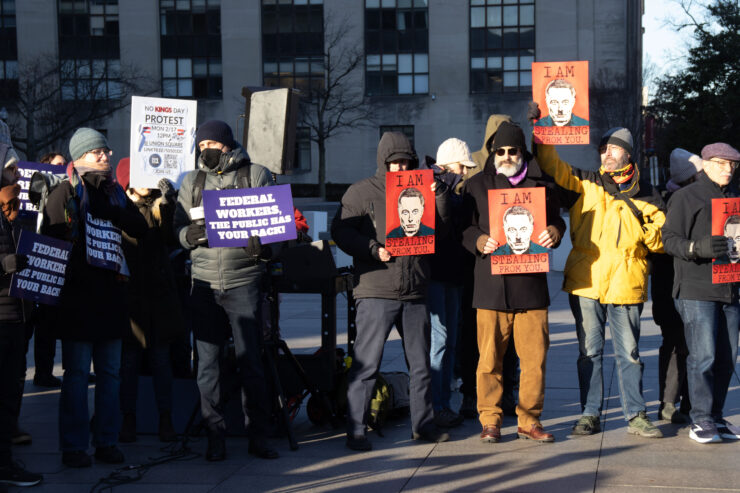By Caleb Ogilvie
Covet is a boutique store in Arlington, stocked with funny stickers, shirts and knickknacks. Owner Autumn Clayton said people have been walking in recently with glazed eyes. They’re looking for a distraction, a laugh and, sometimes, a job.
She said many of those customers are federal employees who have lost or quit their jobs because of President Donald Trump’s actions to reduce the federal government’s size.

“A lot of people come in here to just kind of disassociate from what’s going on because it’s so intense,” Clayton said. “And a lot of times, it’s during the middle of the workday, so you know these people have lost their jobs or been furloughed.”
Trump signed an executive order last Thursday prohibiting collective bargaining for federal workers in many departments, agencies and commissions. Also, last week, a group of former federal employees filed a class action lawsuit against department and agency heads. They claimed they were fired based on their gender, race and perceived political views.
In January, the Office of Personnel Management offered federal employees pay until Sept. 30 if they resigned by Feb. 12, according to the Office’s page for the offer. On March 13, U.S. District Judge William Alsup ruled the Office couldn’t legally fire employees as it did around Feb. 13, according to multiple news outlets. The same day, U.S. District Judge James Bredar ruled that 20 federal agencies must offer to rehire employees the Trump administration fired, according to a memo of the ruling.
Clayton knew the firings and January offer would affect some of her customers’ emotions and finances, she said. So, on Feb. 16, she started offering federal employees a 10% discount with no immediate plans to end it.
“I just want people to see that there is still kindness out there because it’s all so negative and scary and uncertain, and if my silly little shop can make someone happy, then that makes me happy,” Clayton said.
Other regional organizations have recently provided social and legal support to federal workers. Leaders of the organizations said they want to help federal employees as some navigate lost jobs and other potential changes under Trump.
Burke, Virginia’s Presbyterian church hosted a virtual community support group to help people navigate their emotions and Trump’s changes to the federal workforce.
Rev. Becca Messman said federal workers in the church community felt overwhelmed, scared and sad. By sharing their stories, she said they fought their despair.
“It felt inspiring to watch people really listen to each other with such love and such respect,” she said.
Terminations may be throwing former federal employees, particularly those early in their careers, into a spiral of doubt, according to Amy Bernstein. Bernstein, a former speechwriter for the Federal Transit Administration who also worked in the Government Accountability Office, wrote a book about doubt. She said being fired so early into a career with the federal government can make federal employees question their self-worth.
“I have to imagine there’s more than one relatively new federal worker out there who got that pink slip who’s questioning their choices to begin with,” she said.
Those questions can lead to self-hatred, anxiety, depression, indecision and fear, Bernstein said.
“My heart really goes out to all the people trying to manage all of this,” she said.
As people were managing the resignation offer in January, Liz Newman took a new call every 30 minutes. Government employees called Newman, the litigation director of the Jeffrey Law Group, asking for her interpretation of the offer and how they could continue their jobs safely.
Newman said every caller felt anger, frustration, disbelief and fear. People swore, laughed and cried as they weighed their options over the phone.
“Everyone that we have talked to has felt not only personally targeted, but they felt that their colleagues were targeted,” Newman said. “That the work that they were doing was being misconstrued as not important.”
The federal government had never created a mass-scale deferred resignation offer like this, Newman said, so she couldn’t tell her clients whether they’d get paid until Sept. 30 as the offer promised.
What Newman could do, however, was share information. Since January, she has published six messages outlining the legal context of returning to working in person, the deferred resignation offer and investigations into federal employees.
“When you see something like [the deferred resignation offer] if you have information to help someone make a decision on something that is that serious, you need to share it,” Newman said.















Add comment